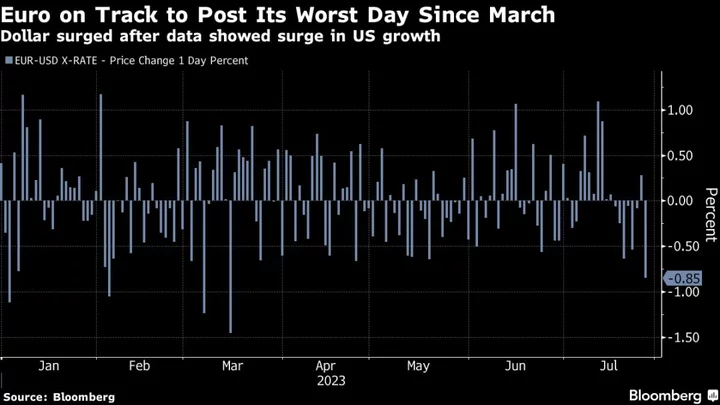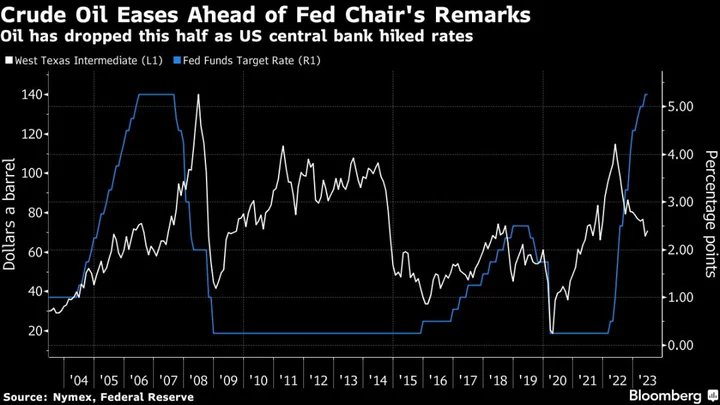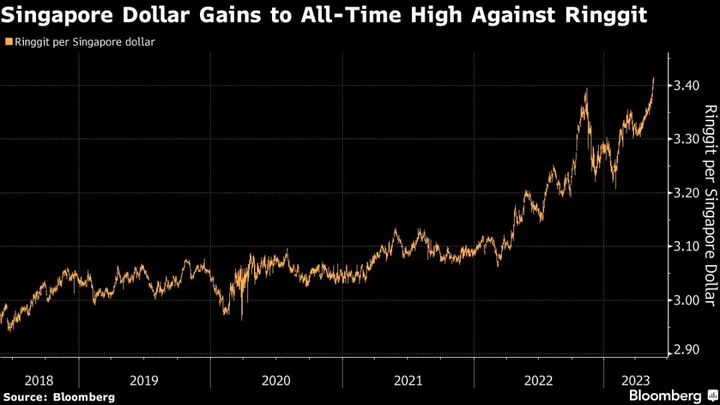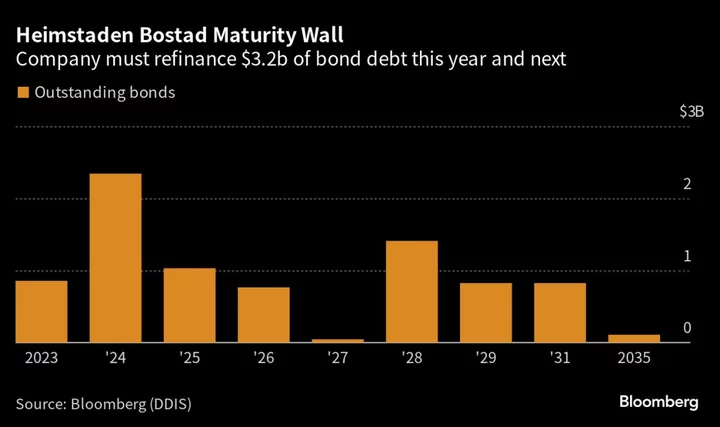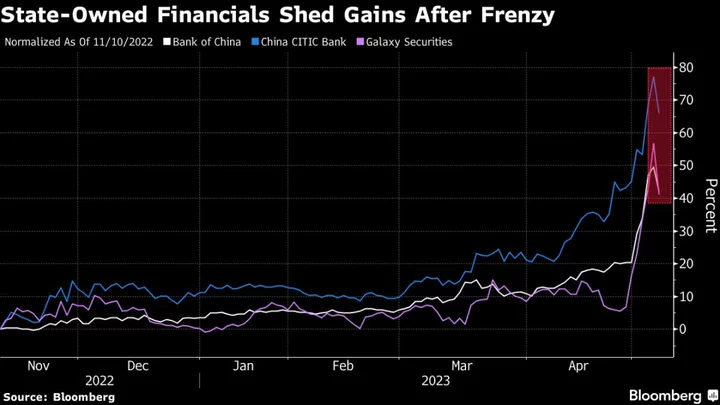Christine Lagarde is confronting how tighter monetary policy is driving the euro-zone economy into the ground in her bid to bring inflation under control.
The European Central Bank president on Thursday offered a downbeat assessment of a “deteriorated” economic outlook as she delivered a ninth consecutive interest-rate increase and said that the Governing Council is open minded on another potential hike in September.
In contrast to the Federal Reserve’s sanguine view that the US might even skirt a downturn, ECB officials are signaling a more worried tone as they recognize more than ever how their actions are hitting activity. Gauging the growth impact is becoming key as they weigh how much more tightening is needed to tame inflation.
“Another set of weak survey data, say end of August, plus maybe not contradictory signals from the inflation point, could get us a pause,” Morgan Stanley Chief European Economist Jens Eisenschmidt — a former ECB official — told Bloomberg Television. “We expect still on balance a hike to 4% in September, but it’s a very close call.”
The decision left the ECB’s policy settings in line with the Fed, which on Wednesday night set out a similar data-dependent framework for deciding whether additional rate hikes are required.
But the economic situation each central bank faces is markedly different, with US growth numbers released just before Lagarde spoke exceeding economists’ expectations by some margin.
The euro sank almost 1% against the dollar after the ECB announcement, and is poised for its biggest drop since March. The losses were compounded by the strong US data and Lagarde’s warnings over the near-term outlook for the economy, saying it has worsened — due largely to weaker domestic demand.
The common currency is now down almost 2% from a peak this month, trimming a spectacular rally that drove it from below parity to its strongest level against the greenback in under a year.
“We think the euro is now vulnerable to a reversal, particularly against the US dollar where the US economy is showing little signs of slowing down,” said Neil Mehta, a portfolio manager at RBC BlueBay.
The divergence is also playing out in the rates market, where the spread between 10-year US and German government bonds has reached the widest level since December.
Lagarde spoke just days after new survey numbers pointed to waning service-sector momentum in tandem with an ongoing manufacturing slump within the region.
The Purchasing Managers’ Index for the region was below the 50 threshold that indicates growth for a second month in a row. July’s reading was the lowest since November and worse than anything predicted by economists in a Bloomberg survey.
The epicenter of weakness is Germany, the euro zone’s biggest economy, where the combination of an energy crunch, falling Chinese demand and higher rates are crushing industry.
But in the wider euro region, demand for loans among companies also plunged by the most on record in the second quarter, a report this week from the ECB showed.
“They’ve seen that the transmission of monetary tightening is serious,” said Bruno Cavalier, chief economist at Oddo BHF SCA. “They can no longer doubt their action will have a restraining impact on demand and prices.”
Bad luck of timing meant that ECB officials took their decision just three working days before the release of the latest euro-zone inflation and growth numbers — hard data, as opposed to just the sentiment and survey reports available to them.
While it’s feasible that the gross domestic product statistics on Monday may show a tourist boom in southern Europe helped the region avoided a contraction in the second quarter, the possibility that Germany stayed in a recession is real. Prospects for the current three-month period look equally gloomy, as officials acknowledged.
“The data on GDP are — to my view — not good,” said former ECB Chief Economist Peter Praet, who reckons the current quarter won’t show a recovery. “The tone, obviously, has changed,” he told told Bloomberg Television.
Lagarde didn’t offer a formal assessment in her remarks. Behind closed doors, policymakers appeared to view growth risks as pointing downwards, while those on inflation as balanced, according to people with knowledge of the debate.
What Bloomberg Economics Says...
“The risk is that moderation in measures of underlying inflation or cracks in the economy cause that final increase to be shelved. Lagarde’s remarks significantly reduce our conviction for a hike in September.”
— David Powell, senior euro-area economist. For the full report click here.
Policymakers are nervously waiting for new inflation numbers on Monday that will show if they’ll further squeeze the economy. Both the headline consumer-price growth and an underlying measure remain above 5% — more than twice the 2% that they’re targeting.
“Economic activity can be collateral damage,” said Jesus Castillo, eurozone economist at Natixis. “Activity would have to really deteriorate enormously before they start to revisit their monetary policy.”
--With assistance from Dani Burger, Kailey Leinz and Zoe Schneeweiss.
Author: Ben Sills, Alice Gledhill and William Horobin

